Life Chances Fund (LCF) Evaluation
We are the UK Government’s evaluation partner for the Life Chances Fund (LCF). Through our engaged research, we are conducting multiple, longitudinal evaluations across the portfolio of 29 projects offered funding by the LCF.
At a glance
The Life Chances Fund (LCF) was launched by the UK government in 2016 to support people facing significant barriers to leading happy and productive lives. It was designed with a specific objective to grow the number and scale of social outcomes partnerships commissioned at local level in England. The programme ran for nine years and provided funding, alongside local commissioners, for 29 projects spanning various policy areas, including child and family welfare, health and wellbeing, employment and training, education, criminal justice and homelessness.
Life Chances Fund in detail
The Life Chances Fund was a £70 million programme funded by the UK Government’s Department for Culture, Media and Sport to support individuals facing significant barriers to leading happy and productive lives.
The programme ran between 2016–2025 and supported the delivery of 29 projects across England. The Fund was administered by the National Lottery Community Fund on behalf of the UK government. The Government Outcomes Lab acted as the learning and evaluation partner for the Fund.
The programme was set up as an outcomes fund, contributing to outcomes payments for locally commissioned social outcomes partnerships (SOPs, also known as social impact bonds). At the time of its launch, the Life Chances Fund was the largest outcomes fund in the world.
The Fund had a specific focus on tackling complex social problems, with target population groups and outcomes metrics agreed locally at project-level. A key principles of the Fund was to enable voluntary, community and social enterprise organisations to take a lead in transforming public services, as service delivery organisations and managers of social outcomes partnerships. The Life Chances Fund envisaged that this service transformation would be delivered through social outcomes partnership that 'take a real systems change approach through genuine risk taking, and through focusing on prevention and early upstream action'.
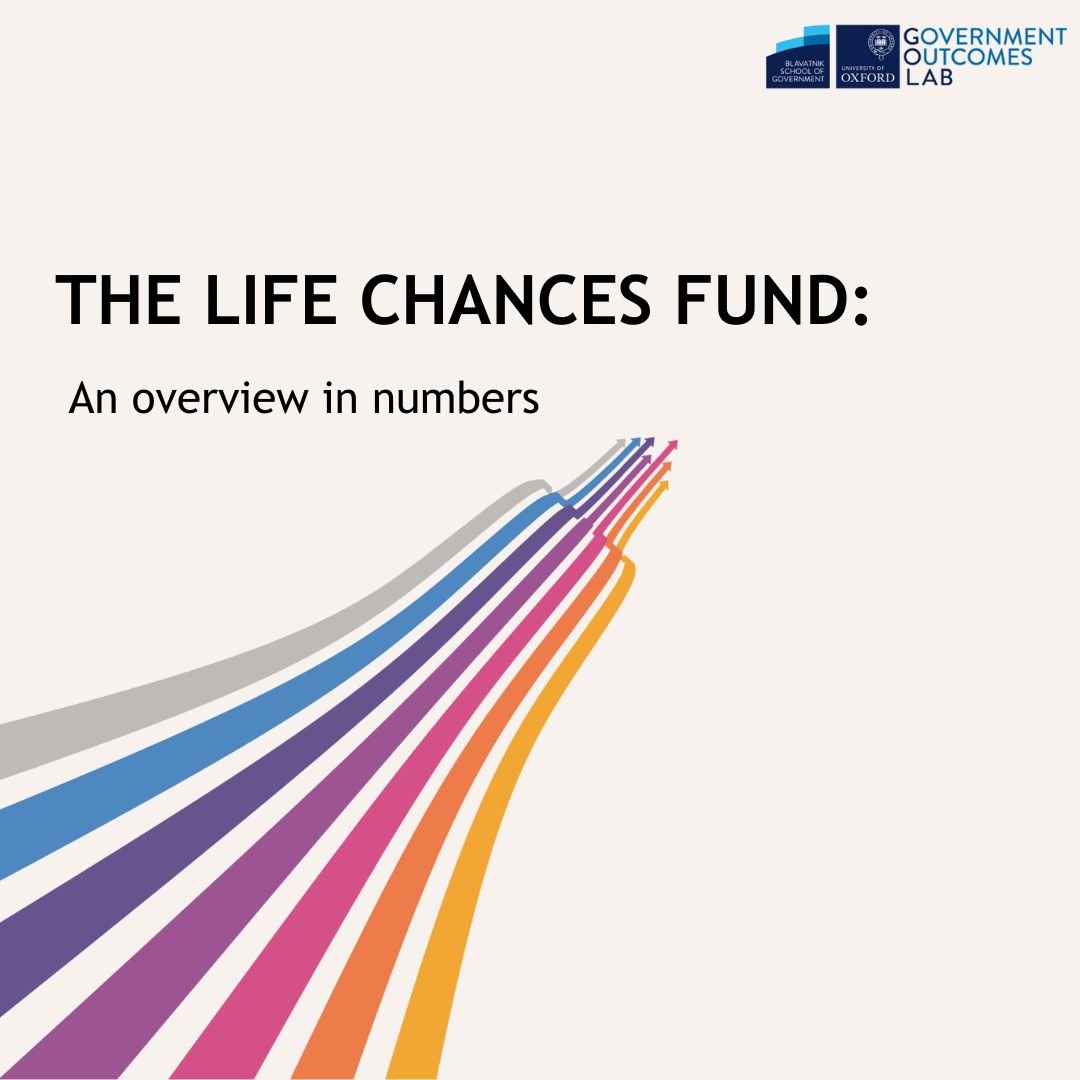
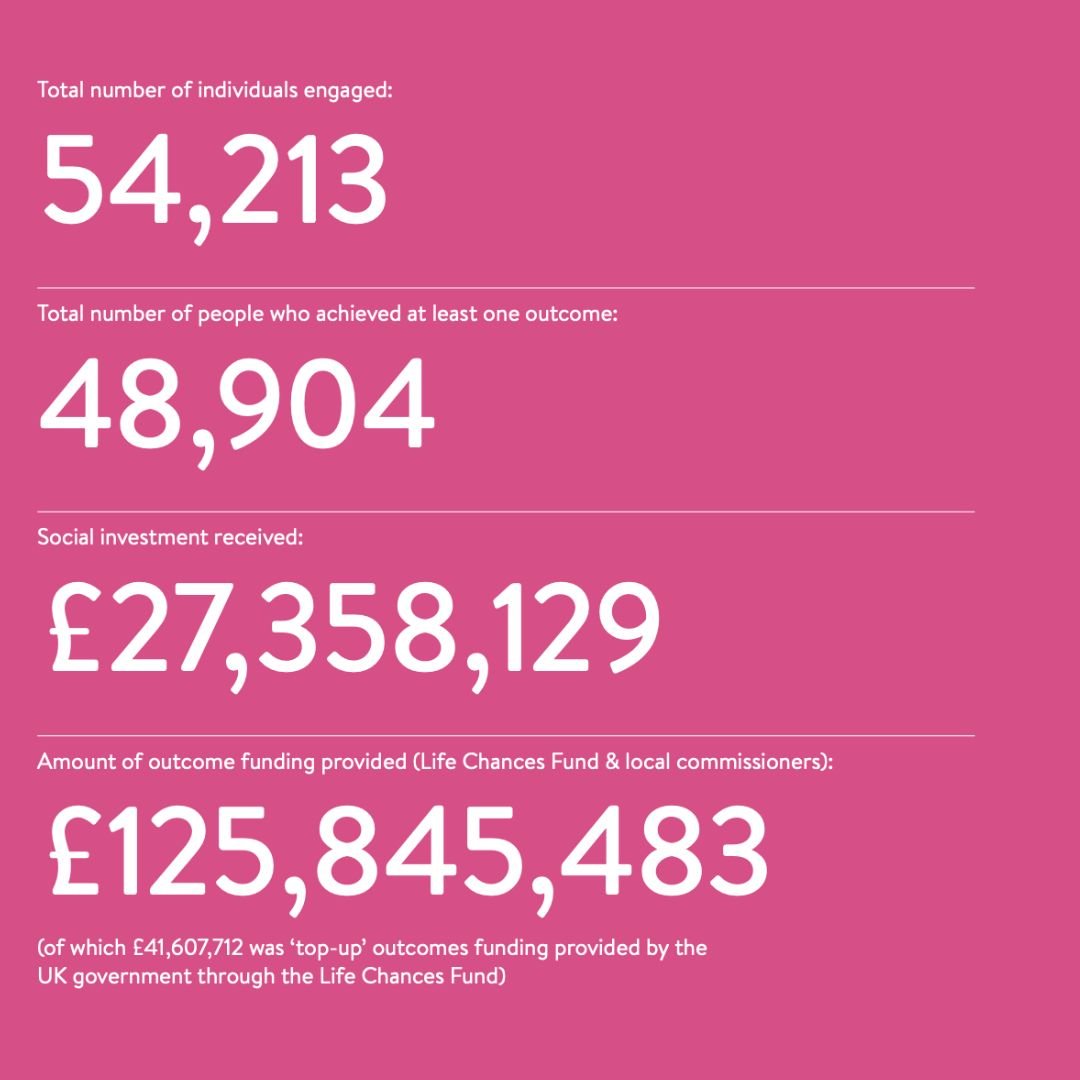
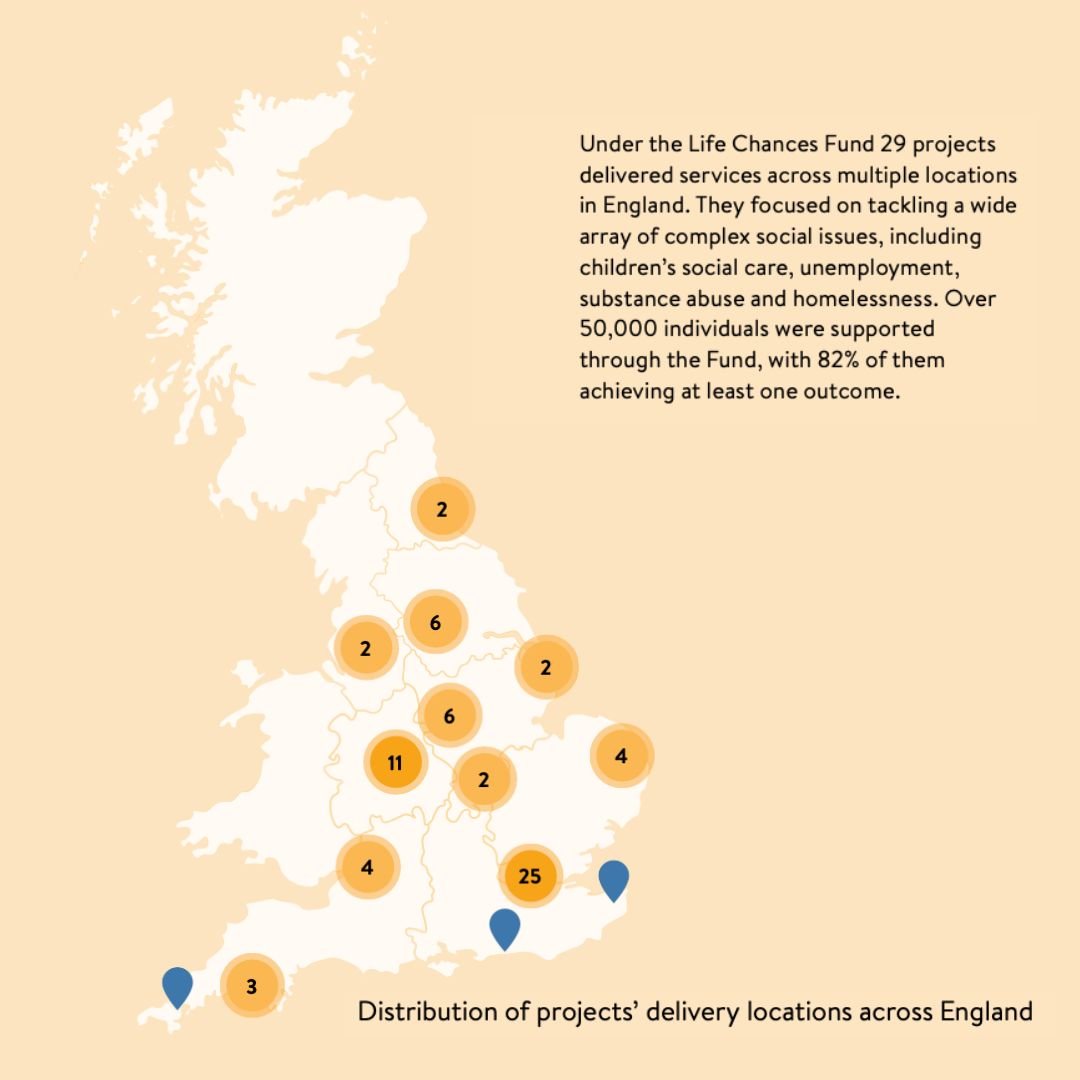
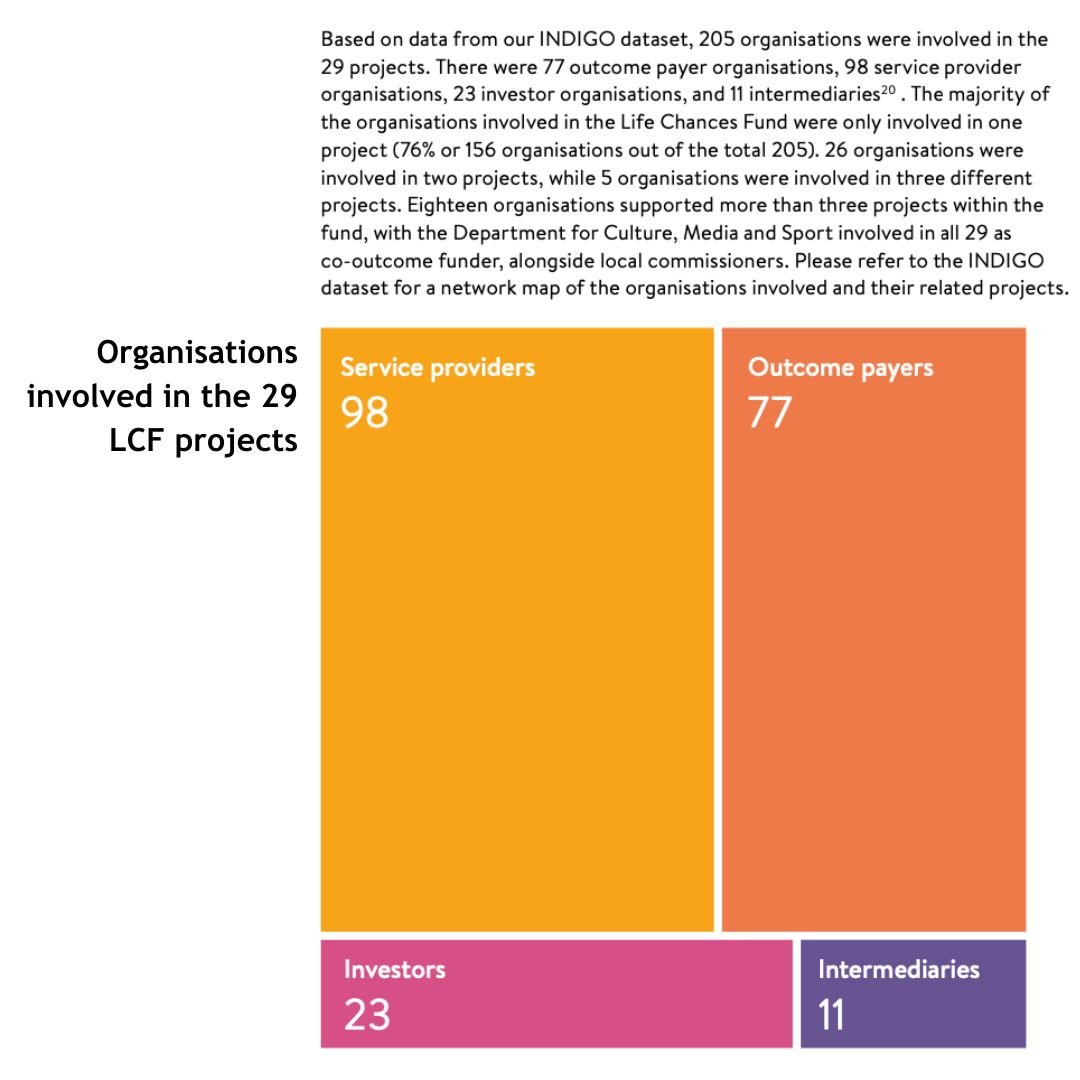
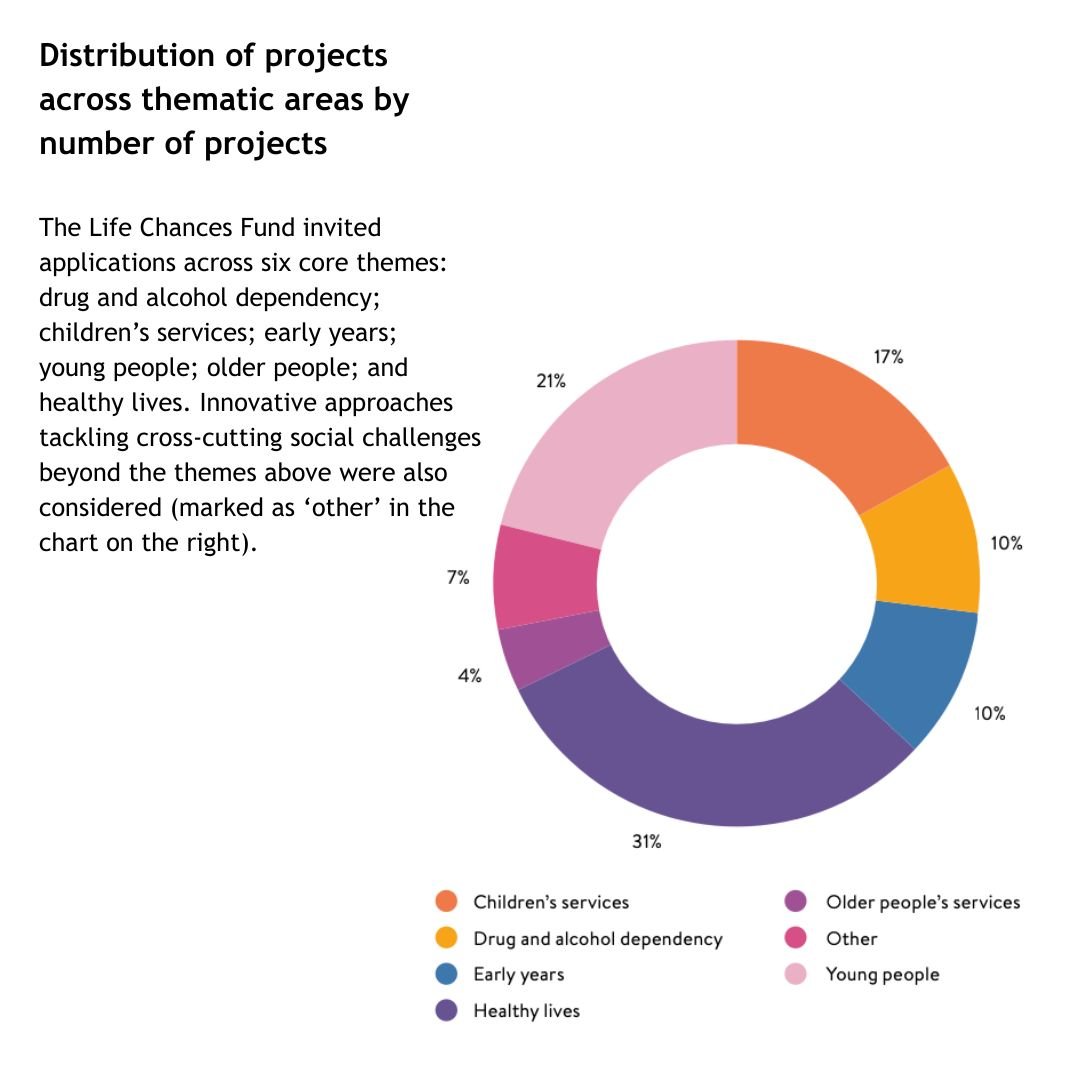
Life Chances Fund data visualisation tool and project list
At the Government Outcomes Lab, we host a global impact bond dataset, where users can explore data on impact bonds projects in their various stages of development and policy areas around the world. You can browse the LCF data using the INDIGO visualisation tool.
Evaluation strategy & GO Lab's role
Government Outcomes Lab
The GO Lab served as the learning and evaluation partner for the Life Chances Fund. The evaluation work began in 2017 and was focused on understanding if, when, and how social outcomes partnerships offer a better model for commissioning social programmes than more conventional commissioning approaches, such as fee-for-service contracts.
Alongside this evaluation work, the GO Lab worked with the UK government and other stakeholders to develop knowledge resources and learning opportunities for those interested in social outcomes partnerships. The GO Lab also hosts a global dataset on social outcomes partnerships, which includes granular outcomes achievement data for all the projects supported by the Life Chances Fund. This approach has led to a large body of evidence, learning and data being publicly available well before
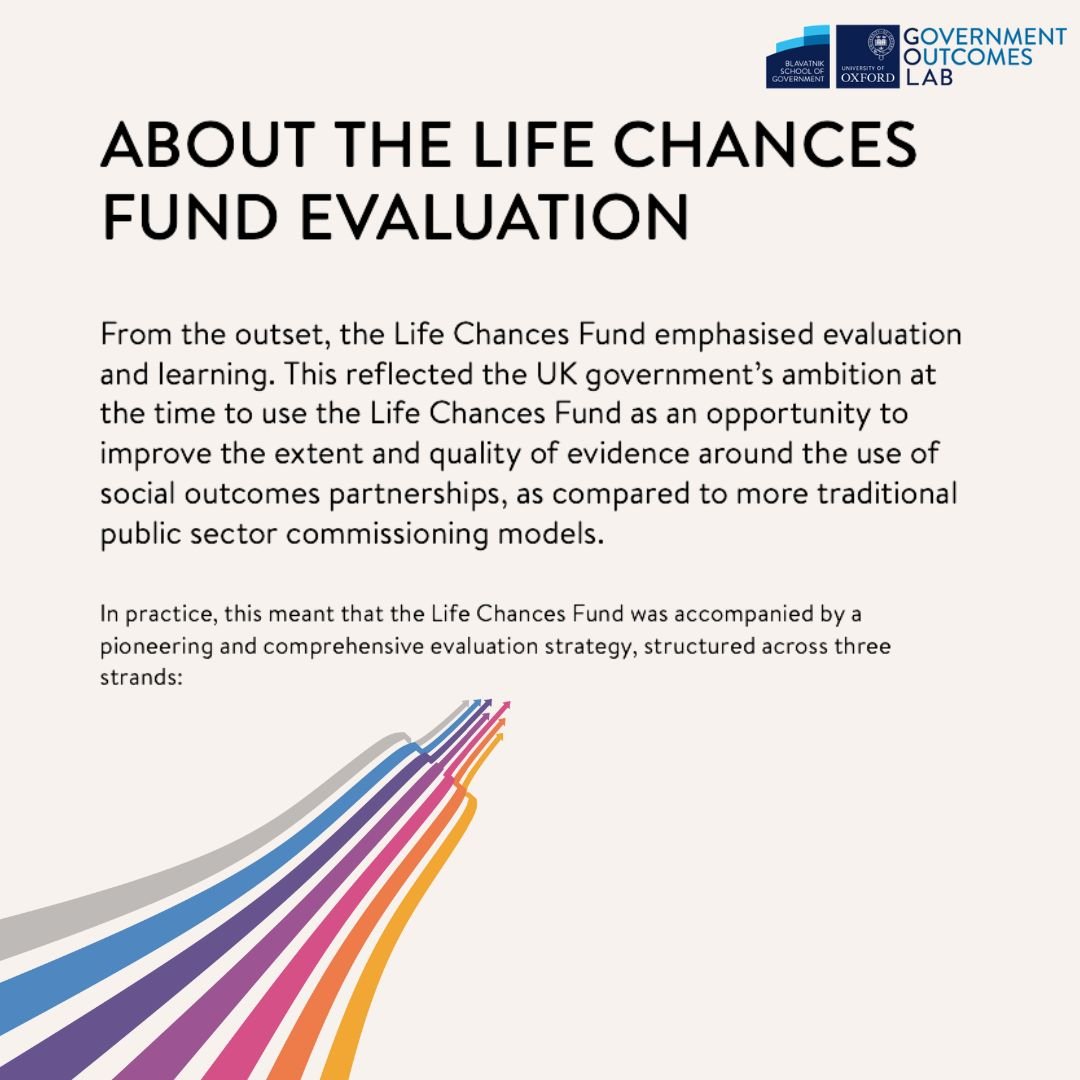
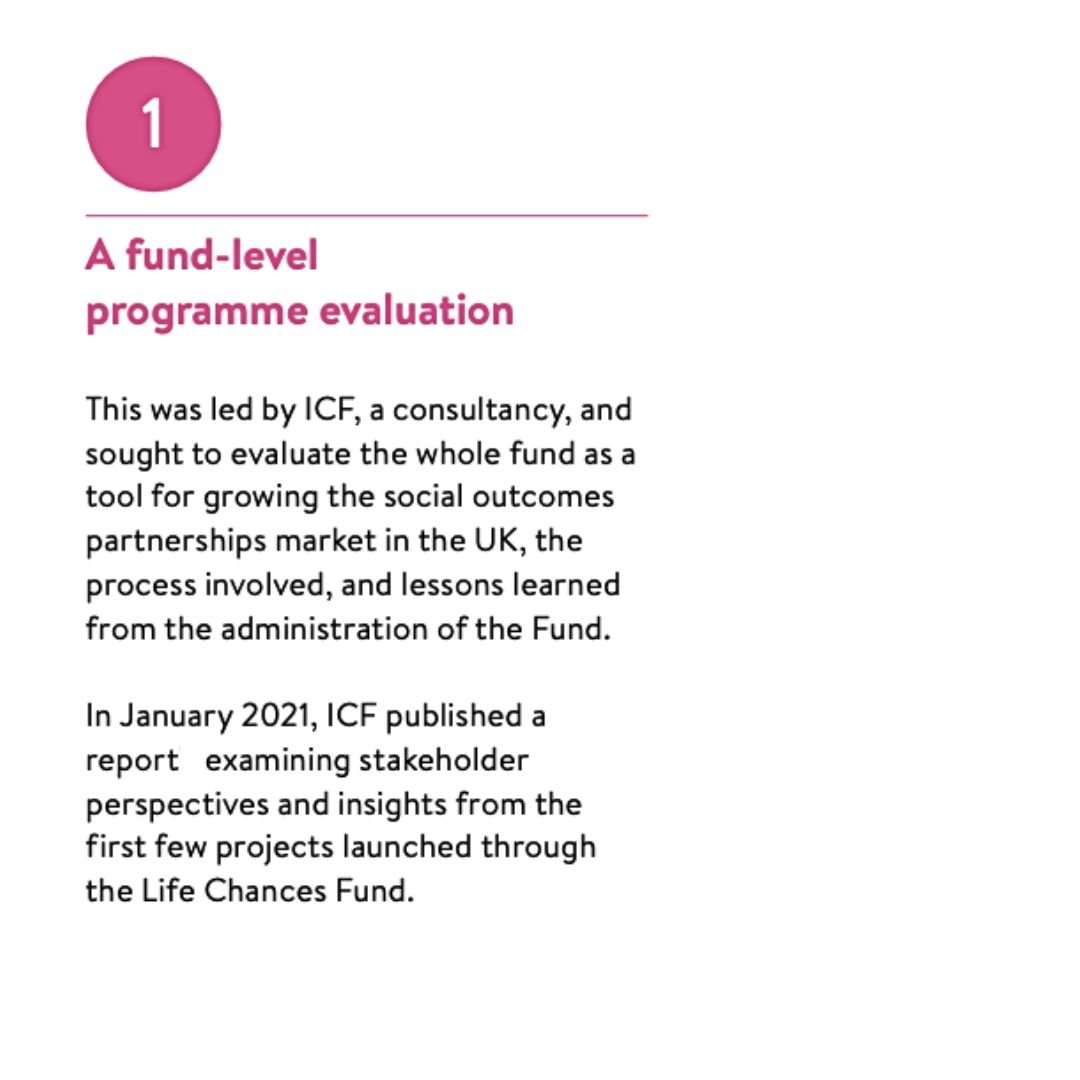
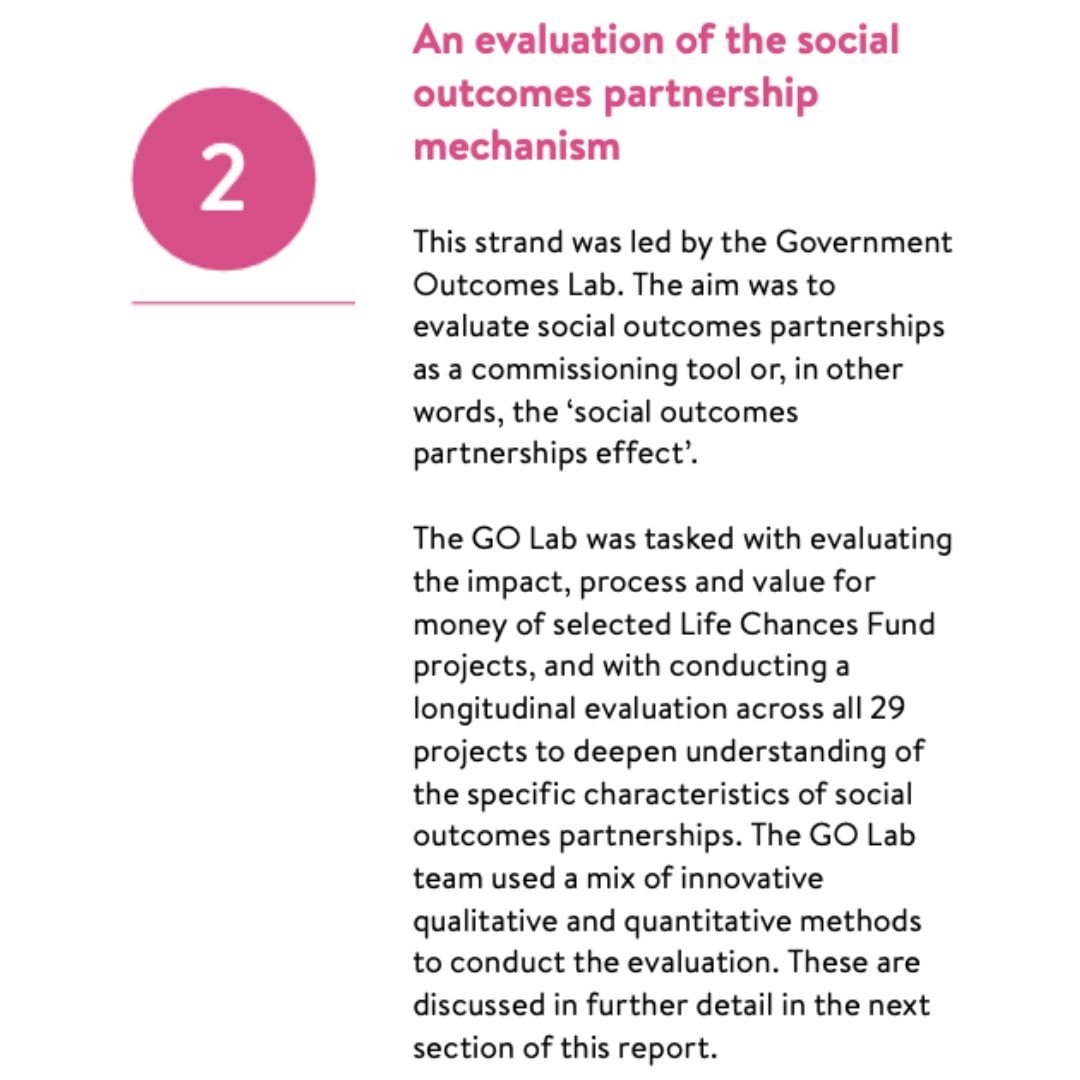
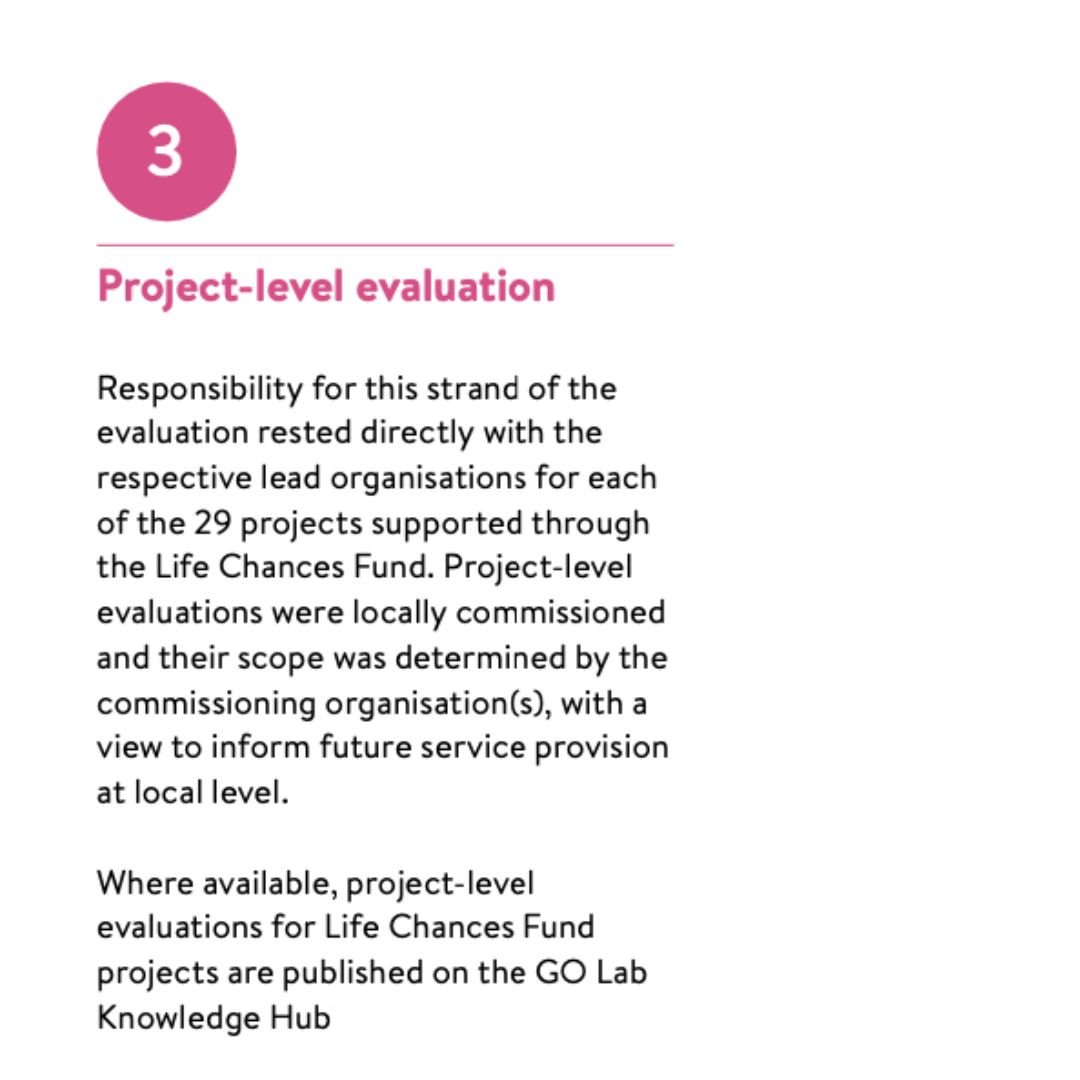
Evaluation of the social outcomes partnership mechanism
The first report focused on capturing insights from the early stages of project mobilisation. Following the onset of Covid-19 restrictions in March 2020, the report also captured the impact of the pandemic on LCF projects, including adaptations made to service delivery and funding decisions. This also led to an academic paper on organisational resilience during Covid-19. The paper, published in Public Management Review, was presented by GO Lab Research Fellow Dr Ruth Dixon at the International Research Society for Public Management annual conference.
The second interim data release was published in August 2023. This report focused on the implementation experiences of stakeholders.
The third and final interim data release was published in July 2025. This report seeks to capture how stakeholders’ experiences have changed across waves, while also focusing on insights specific to project completion.
An introduction to Life Chances Fund projects and their early adaptations to Covid-19
11 February 2022
Authors: C. FitzGerald, T. Hameed , F.Rosenbach, J.R. Macdonald, J. Outes Velarde. & R. Dixon
We are delighted to share our interim report from the primary evaluation of the Life Chances Fund (LCF).
As the evaluation partner of the LCF, The Government Outcomes Lab is conducting evaluation across the portfolio of 31 projects offered funding by the LCF. The fund is dedicated to supporting the growth and development of outcomes-based commissioning through the use of social impact bonds (SIBs), by providing a top-up payment to local government commissioners.
While the research initially focused on investigating the characteristics of LCF projects, the research pivoted in March 2020. Following the onset of Covid-19 restrictions, our researchers sought to capture the impact of the pandemic on LCF projects, and the projects’ subsequent adaptations.
Read the report here: An introduction to Life Chances Fund projects and their early adaptations to Covid-19
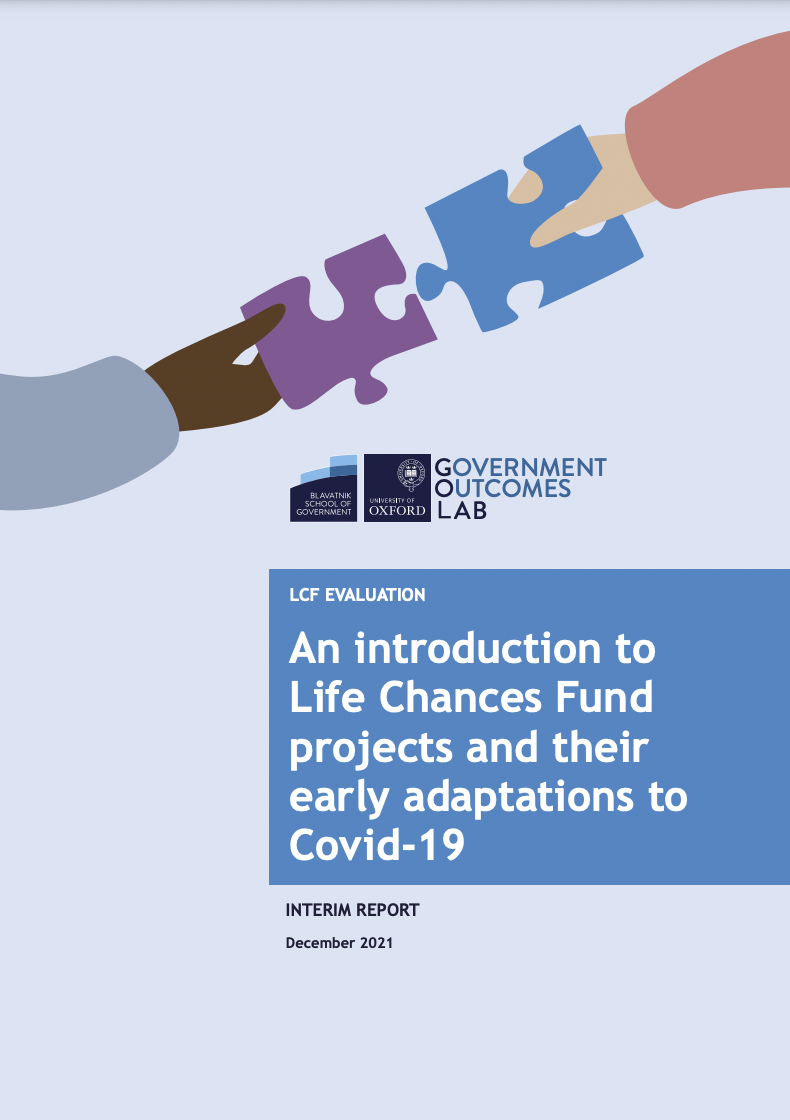
Life Chances Fund intermediate evaluation: data release
31 August 2023
This data release presents interim findings from the primary evaluation of the Life Chances Fund (LCF). Specifically, the report provides analysis of two waves of a longitudinal survey of LCF providers, commissioners, investors and intermediaries.
The survey analysis explores four aspects of the LCF’s development and delivery, namely: project development; implementation and delivery; trust and collaboration; and performance management.
View the resource here: Life Chances Fund intermediate evaluation: data release
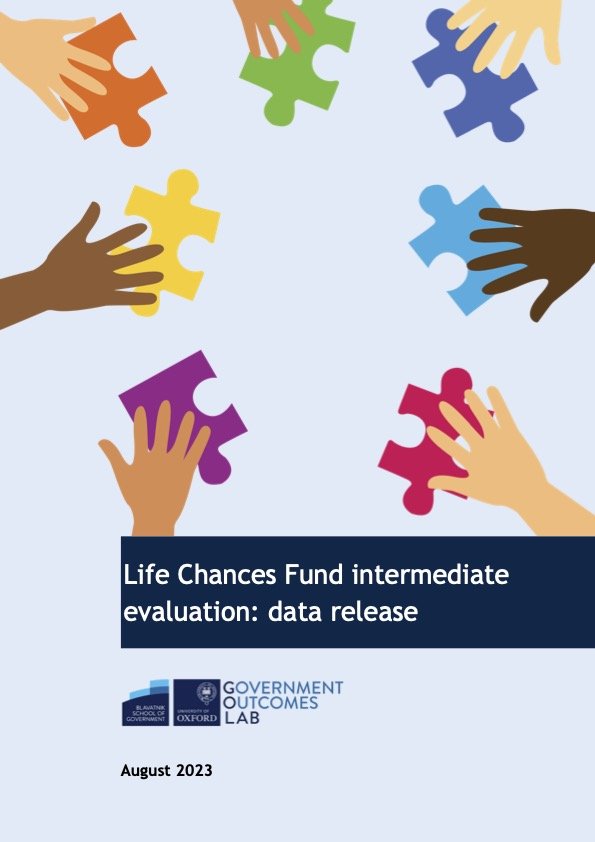
7 July 2025
Authors: De Gruyter, E.
This report is the third of three reports from the LCF Primary Evaluation which seeks to provide descriptive information on all projects established from the LCF through a longitudinal survey. This report focuses on Wave 3, which explores implementation benefits and drawbacks; collaboration and trust between stakeholder organisations; reflections on organisational and performance management practices; and the legacy of the LCF.
It follows two previous reports from earlier waves of the LCF Primary Evaluation Survey. The first report (Wave 1) focused on capturing insights from the early stages of project mobilisation. The second report (Wave 2) was a data release which focused on the implementation experiences of stakeholders. This report builds on this and seeks to capture how stakeholders’ experiences have changed across waves, while also focusing on insights specific to project completion.
View the resource here: Life Chance Fund final evaluation: Data release
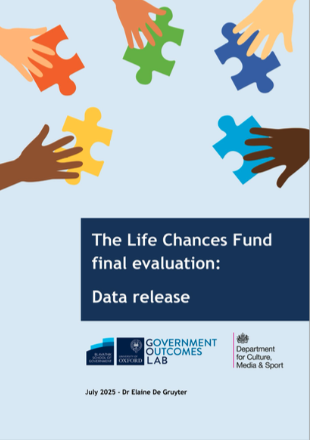
Project-level evaluations
Kirklees Better Outcomes Partnership
The Kirklees Better Outcomes Partnership (KBOP) SOP seeks to improve a range of outcomes for vulnerable adults in need of support to live independently. The project offers an exciting evaluation opportunity as it was preceded by similar provision of ‘floating support’ under fee-for-service contracting arrangements. The first report from the Kirklees supplementary evaluation, focusing on the legacy fee-for-service contracting arrangements and the potential of the SIB model, was published in July 2021.
The second interim report further examines four mechanisms identified in the first interim evaluation of the KBOP SOP.
The final report, published in July 2025, examine the implications of these mechanisms, particularly for the delivery of complex, person-centred public services.
Kirklees Integrated Support Service and Better Outcomes Partnership: The first report from a longitudinal evaluation of a Life Chances Fund impact bond
01 December 2020
Authors: Rosenbach, F. and Carter, E.
This is the first Government Outcomes Lab report from our supplementary evaluation of the UK Government’s Life Chances Fund (LCF) which focuses on The Kirklees Integrated Support Service (KISS) Social Impact Bond (SIB). The KISS SIB seeks to improve a range of social outcomes for vulnerable adults who are understood to need support to live independently. The outcomes contract is held by a special purpose vehicle (Kirklees Better Outcomes Partnership, KBOP), which in turn manages individual service delivery contracts with independent provider organisations.
This SIB is a particularly promising evaluation site, as it was preceded by similar provision of ‘Floating Support’ under bilateral fee-for-service arrangements between the Council and the same providers. Analysis of this changed contractual arrangement may help to disentangle the effect of the SIB model from that of the intervention. A range of primary data collection methods were used, including in-depth interviews, documentary analysis and qualitative analysis.
The report identifies four broad challenges faced under the pre-existing fee-for-service arrangements and commissioning environment prior to the adoption of the SIB model in September 2019. These challenges provide hypotheses for future waves of research, which will explore the adoption of the new SIB model.
View the resource here: Kirklees Integrated Support Service and Better Outcomes Partnership: The first report from a longitudinal evaluation of a Life Chances Fund impact bond
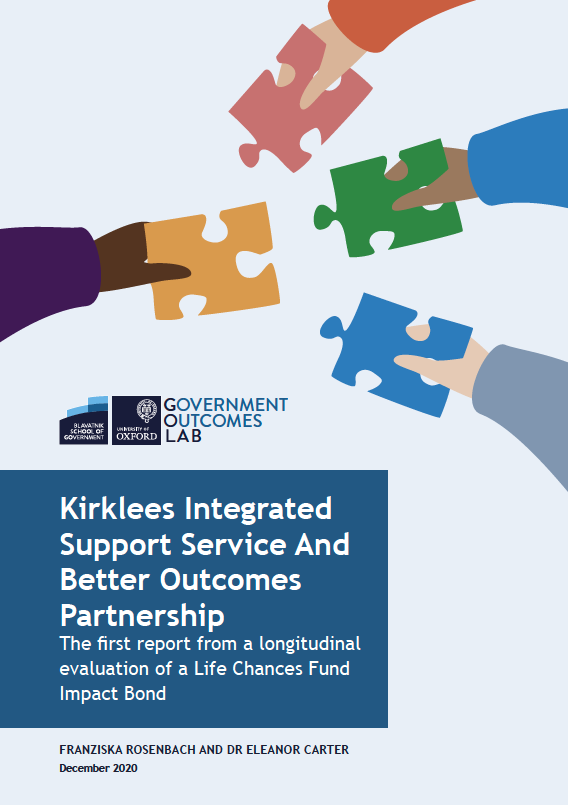
Life Chances Fund Second Stage Evaluation Report: Kirklees
31 August 2023
Authors: Franziska Rosenbach, Felix van Lier, Fernando Domingo, Eleanor Carter
This is the second of three planned reports within a longitudinal evaluation of the Kirklees Better Outcomes Partnership (KBOP). KBOP seeks to improve accommodation, employment, stability and wellbeing outcomes for vulnerable adults who are in need of support to live independently.
KBOP is part-funded by the Department for Culture, Media and Sport (DCMS) under the Life Chances Fund (LCF). The LCF was launched in 2016 to tackle entrenched social issues across England through locally-led social impact bonds (SIBs) - also known as social outcomes partnerships. The LCF contributes to SIB projects through payments-by-results contracts. These contracts involve social investors and are locally commissioned.
DCMS is working in partnership with the Government Outcomes Lab (GO Lab) to evaluate the LCF and the use of SIBs in local commissioning. KBOP was selected for specific longitudinal study because it was preceded by a similar service provided under bilateral fee-for-service arrangements between the Council and the same providers. Analysis of this changed contractual arrangement may help to isolate the effect of the SIB model on service delivery. The analysis is based on a range of primary data collection methods involving 38 in-depth interviews and documentary analysis, including contract terms of the fee-for-service contract and the SIB
This second interim report examines four hypotheses developed in the first interim evaluation of the KBOP SIB. These suggested that the SIB mechanism might lead to enhanced:
- practice of market stewardship
- performance management
- collaboration
- flexibility and personalisation of the service
The report also reviews KBOPs contractual framework and governance processes, and concludes with a series of key learnings from the process evaluation.
View the resource here: Life Chances Fund Second Stage Evaluation Report: Kirklees
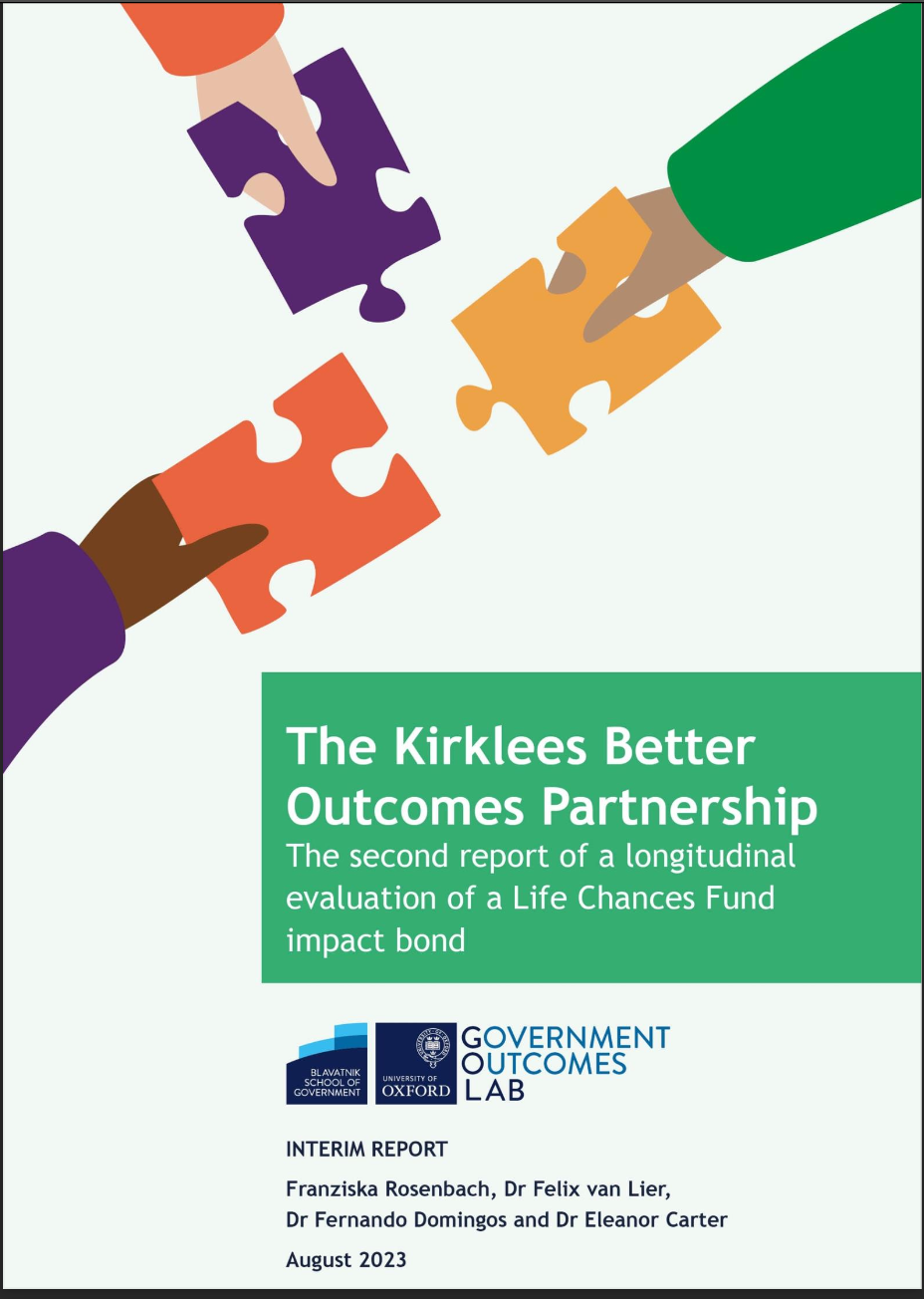
7 July 2025
Authors: Rosenbach, F., van Lier, F., Carter, E., and Patouna, M.
This is the final report of a five-year research study investigating how using a social outcomes partnership influenced the management approaches and practices of the Council, providers and frontline service delivery in the Kirklees Better Outcomes Partnership (KBOP). The evaluation compared the SOP model with the Council’s previous commissioning approach, a traditional fee-for-service model. Both contracts covered housing support for people experiencing multiple and complex disadvantage and were delivered by the same providers (except one which exited the SOP contract early in delivery).
The evaluation asked: what mechanisms within the SOP contributed to changed services and successful social outcomes? In the first interim evaluation we identified four mechanisms by which the SOP model may influence service delivery and user outcomes. These are:
- enhanced market stewardship
- strengthened and data-led performance management
- cultivation of cross-provider collaboration
- enhanced flexibility and personalisation of frontline services.
In this report, we examine the implications of these mechanisms, particularly for the delivery of complex, person-centred public services. The evaluation used a theory-based approach, applying a generative causation lens to assess how and why these mechanisms contributed to observed changes.
View the resource here: The Kirklees Better Outcomes Partnership: The final report of a longitudinal evaluation of a Life Chances Fund outcomes
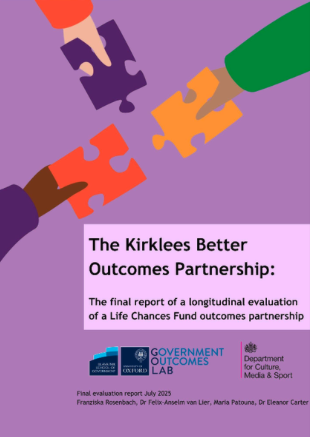
The Life Chances Fund (LCF) was the UK’s largest outcomes fund, supporting 29 locally commissioned social outcomes partnerships to address complex social issues. The Kirklees Better Outcomes Partnership (KBOP) was one of these initiatives, aiming to improve employment, housing stability, and wellbeing for adults with housing-related support needs.
This report presents findings from a one-year Labour Market Evaluation Pilot comparing KBOP’s person-centred, outcomes-based model with the traditional fee-for-service approach previously used in Kirklees. Using linked administrative data and a quasi-experimental design, the study assesses whether the outcomes-based model delivered better results and greater cost-effectiveness.
The evaluation finds that KBOP participants achieved higher rates of sustained employment, greater independence from housing benefits, and improved cost-effectiveness per outcome compared to the legacy model. These results add robust evidence on the potential of outcomes-based commissioning to improve services for people facing severe and overlapping disadvantage.
View the resource here: Labour Market Evaluation Pilot Fund: Understanding the effects of person-centred service reforms in housing support
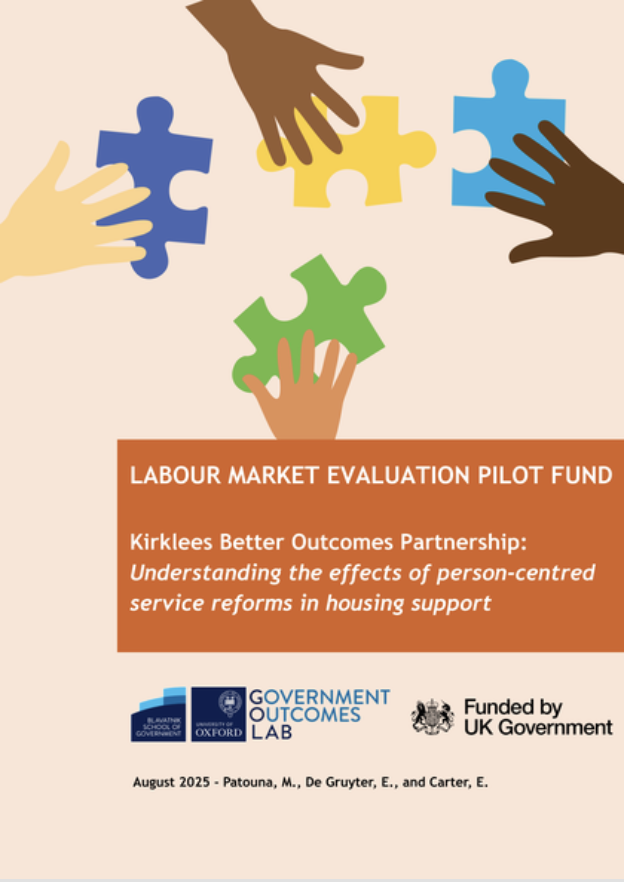
Mental Health and Employment Partnership
The five Mental Health and Employment Partnership (MHEP) SOPs commissioned through the LCF form the most recent supplementary evaluation project. The evaluation aims to answer whether and how MHEP SOPs - specifically the outcomes contracts and/or performance management function – make a difference to the social outcomes achieved, compared to alternative commissioning approaches. It also allows investigation of the mechanism by which a SOP model (e.g., adaptive performance management) influences outcomes alongside established, evidence-based interventions (e.g., the Individual Placement Support intervention).
The first interim report of the MHEP evaluation provides information on the project’s theory of change including facilitators, barriers and mediating mechanisms, as well as presenting early quantitative analysis on outcome performance.
The second interim evaluation report primarily presents evidence from the qualitative process evaluation, focused on the implementation and delivery of the MHEP projects.
The final report asks two primary questions: whether the Mental Health and Employment Partnership (MHEP) SOP made a difference to the social outcomes achieved, compared with alternative commissioning approaches, and through which mechanisms it contributed to improved services and positive social outcomes.
Mental Health and Employment Partnership evaluation for the Life Chances Fund: First interim report
23 March 2023
Authors: E. Hulse, M. Shiva, , T. Hameed & E. Carter
This is the first of three planned reports within a longitudinal evaluation of the Mental Health and Employment Partnership (MHEP).
MHEP is part-funded by the Department for Culture, Media and Sport (DCMS) under the Life Chances Fund (LCF). The LCF was launched in 2016 as a locally-led SIB fund to tackle entrenched social issues across England. The LCF contributes to SIB projects through payments by results contracts. These contracts involve social investors and are locally commissioned.
DCMS is working in partnership with the Government Outcomes Lab (GO Lab) to evaluate the LCF and the use of SIBs in local commissioning. MHEP was selected for specific longitudinal study because of the existence of comparable projects using traditional commissioning routes. Its findings are based on qualitative interview data and aggregate performance data across the five SIBs
The first interim report of the MHEP evaluation provides information on the project’s theory of change including facilitators, barriers and mediating mechanisms, as well as presenting early quantitative analysis on outcome performance.
View the resource here: Mental Health and Employment Partnership evaluation for the Life Chances Fund: First interim report
Mental Health and Employment Partnership evaluation for the Life Chances Fund: Second interim report
4 November 2024
Authors: E. Hulse, S. Nagarajan & E. Carter
This is the second of three planned reports within a longitudinal evaluation of the Mental Health and Employment Partnership (MHEP).
MHEP supports people experiencing poor mental health, or with learning disabilities, to enter and remain in employment. It operates five LCF-funded projects across Haringey and Barnet, Shropshire, Enfield and Tower Hamlets.
The second interim evaluation report primarily presents evidence from the qualitative process evaluation, focused on the implementation and delivery of the MHEP projects. It explores the experiences of key stakeholders, including commissioners, providers, investors, and the MHEP management team. In doing so, the report looks to further test the theory of change mechanisms set out in the first report.
The process evaluation draws on qualitative evidence from 27 semi-structured interviews with MHEP stakeholders, participant observation (conducted between August 2022 and January 2024), and analysis of key project documents. The report also provides updated quantitative data on programme performance.
View the resource here: Mental Health and Employment Partnership: Second interim report
7 July 2025
Authors: Hulse, E., Grennan, E., Airoldi, M., and Carter, E.
This is the third and final report of a five-year research study investigating the effectiveness of social outcomes partnerships (SOPs) as a commissioning tool to improve social outcomes for citizens. The report asks two primary questions: whether the Mental Health and Employment Partnership (MHEP) SOP made a difference to the social outcomes achieved, compared with alternative commissioning approaches, and through which mechanisms it contributed to improved services and positive social outcomes.
This inquiry is framed through four questions in the report:
- Were the MHEP SOPs effective in achieving their outcomes targets and how does their effectiveness compare with that of traditionally commissioned IPS contracts?
- Did the SOP have higher costs than expected and if so, why?
- Was the SOPs’ outcomes achievement (the SOP effect) related to the intensity of the performance management or performance incentive?
- How were different actors incentivised for performance?
View the resource here: The Mental Health and Employment Partnership: The final evaluation of the Life Chances Fund outcomes partnerships
Children’s Social Care
Between 2019 and 2020, the team undertook cross-sectional research to explore the business cases lying behind seven Life Chances Fund projects related to the state care of vulnerable children. The research worked closely with local government stakeholders to investigate justifications for using an impact bond model when supporting children in or on the ‘edge’ of care. Theories of change were built for each of the projects alongside procurement and economic analyses. The study also explored facilitators and challenges within the development processes, as well as design considerations and standardisation across the seven projects. The LCF Children’s Social Care report was published in July 2021 and the findings will feed into the UK government’s recently launched Care Review.
12 May 2021
Authors: T. Hameed, E. Carter, J. R. Macdonald, M. Shiva, C. Baker
This Government Outcomes Lab report provides findings on seven children’s social care projects commissioned through Social Impact Bonds (SIBs) that are part of the Department for Digital, Media, Culture & Sport (DCMS)’s Life Chances Fund (LCF). The research investigates the justifications and alternative SIB design approaches adopted by local authority commissioners to support children and families ‘on the edge’ of (or already within) the statutory care system. It used qualitative methods, including analysis of key documents, workshops and semi-structured interviews with relevant stakeholders.
Read the report here: The use of social impact bonds in children’s social care: A comparative analysis of project justifications and design considerations in the Life Chances Fund
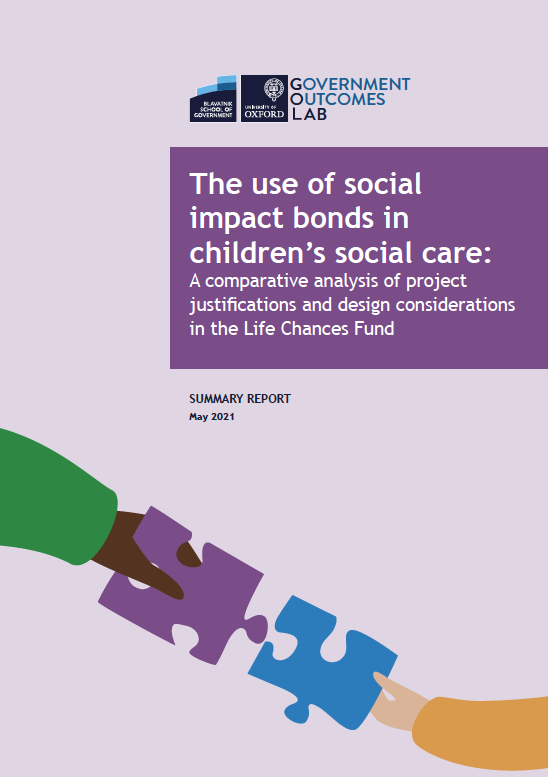
GO Lab Research Reports
Life Chances Fund - Functional Guidance
05 March 2019
Authors: Government Outcomes Lab, DCMS, National Lottery Community Fund
This functional guidance is created for Life Chances Fund projects to support them to upload their information to the DCMS platform. There are four main steps to take and each will be broken down into instructions and screen shots.
- Offer letter baseline
- Payment profile
- Outcome achievement and payment claim
- Annual monitoring form
You can view extra support from the GO lab for Life Chances Fund projects through following the link below, and you can also view the PDF to see the functional guidance.
View the resource here: Life Chances Fund - Functional Guidance
Resilience in public service partnerships: evidence from the UK Life Chances Fund
16 December 2021
Authors: C. FitzGerald, T. Hameed, F. Rosenbach, J. R. Macdonald & R. Dixon
This paper explores functional and structural resilience in outcomes-based public service partnerships. Using a theoretical framework informed by socio-ecological and health fields, and data from all thirty-one social impact bonds (SIBs) funded through the UK government’s Life Chances Fund, we explore how SIBs adapted service delivery and funding mechanisms in response to Covid-19.
View the resource here: Resilience in public service partnerships: evidence from the UK Life Chances Fund
Life Chances Fund case studies
23 May 2023
The Skill Mill is a social enterprise which employs young ex-offenders, working on environmental projects across the UK.
Read the case study here: The Skill Mill
The Stronger Families Norfolk social outcomes partnership (SOP) uses Functional Family Therapy for Child Welfare to support families and children on the edge of care.
Read the case study here: Stronger Families Norfolk
09 December 2022
The DN2 Children’s Services Social Impact Bond aims to provide children and young people aged between 10 and 17 with a stable and nurturing environment that is conducive to their well-being and improved educational outcomes.
Read the case study here: DN2 Children’s Services Social Impact Bond
02 September 2022
MHEP involves five place-based outcomes contracts (i.e., five SIB projects) that support people experiencing mental health issues or learning disabilities to find and remain in competitive, paid work in the UK.
Read the case study here: Mental Health and Employment Partnership (MHEP)
03 August 2023
The Kirklees Better Outcomes Partnership (KBOP) impact bond aims to secure better outcomes for disadvantaged Kirklees residents. This project is funded by the UK Government Department for Digital, Culture, Media and Sport's (DCMS) Life Chances Fund (LCF) and by Kirklees Council.
Read the case study here: Kirklees Better Outcomes Partnership (KBOP)
22 June 2022
The Future Impact social impact bond (SIB) is funded under the UK Government Department for Digital, Culture, Media and Sport's (DCMS) Life Chances Fund (LCF). The SIB aims to support young people aged 15 to 24 with special educational needs in Nottingham and Nottinghamshire through education and training programmes to ultimately move into and sustain employment or voluntary work.
Read the case study here: Future Impact
31 May 2022
The Chances Programme social impact bond (SIB) is funded under the UK Government Department for Digital, Culture, Media and Sport's (DCMS) Life Chances Fund (LCF). The SIB aims to use sport and physical activity to provide new opportunities and alternative life pathways for children and young people in disadvantaged areas whilst improving their health and wellbeing.
Read the case study here: Chances
01 October 2019
WLZ designed a Collective Impact approach to leverage the local “social assets” around a shared vision. WLZ actively supports each partner and provides a Link Worker for each child, who builds a trusted, lasting relationship with the child and their family, helping them set their own goals for the future and working with charity partners on the ground to ensure that delivery is consistent and tailored to each individual.
Read the case study here: West London Zone Collective Impact Bond